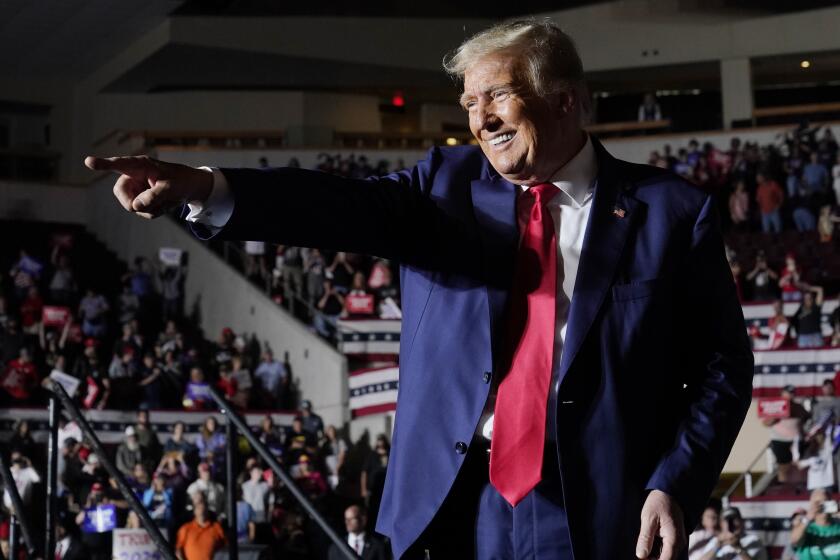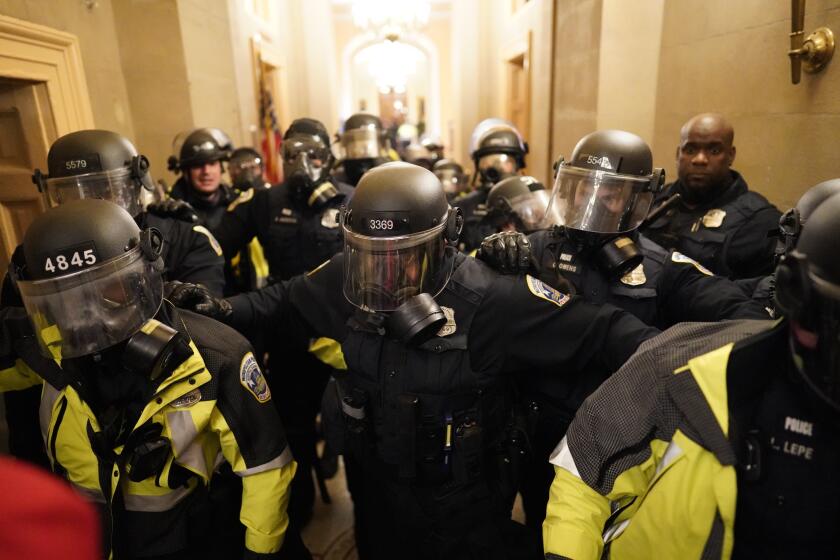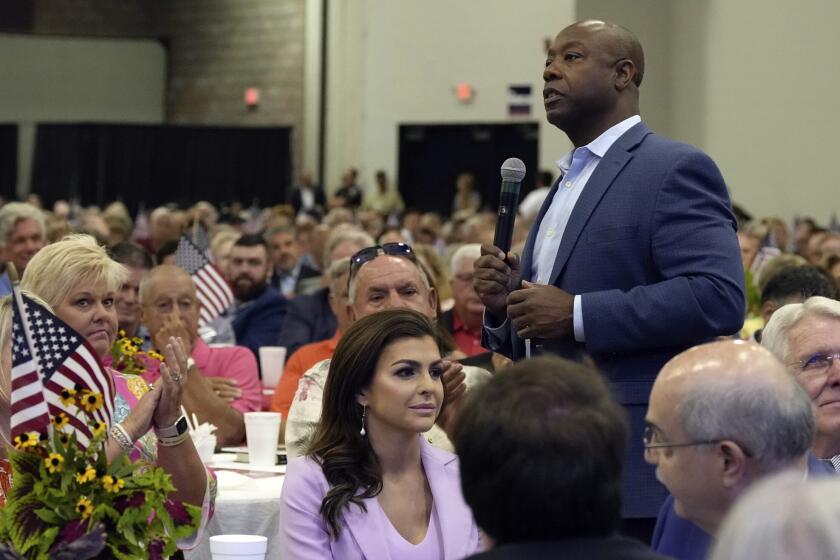Should Supreme Court disqualify Trump from running? Justices may be asked to rule
- Share via
The Constitution disqualifies those who “engaged in insurrection” from holding office, and two conservative law professors say that applies to the former president.
- Share via
WASHINGTON — In the aftermath of the Civil War, the Constitution was amended to disqualify from office those political leaders who had betrayed their oath and “engaged in insurrection or rebellion” against the United States.
Many historians believed that provision — Section 3 of the 14th Amendment — became a dead letter after Congress adopted amnesty acts for ex-Confederates in 1872 and 1898. The latter act declared the “disability imposed” by Section 3 “is hereby removed.”
But some law professors who have delved deeply into the history of that era say that view is wrong.
“Despite its long slumber, Section 3 ... is alive and in force,” and it could have a major impact on next year’s election, argue law professors William Baude of the University of Chicago and Michael Stokes Paulsen of the University of St. Thomas, both well-regarded conservatives.
In a 126-page law review posted last month, they put a new focus on the Constitution’s response to the nation’s greatest insurrection and find significantly higher odds that the Supreme Court will be confronted with the claim that former President Trump, the Republican front-runner in polls for 2024, is legally disqualified from holding office.
As constitutional originalists, Baude and Paulsen believe the document’s terms should be interpreted in line with how they were understood at the time of their adoption. They say the word “insurrection” was understood to refer broadly to the concerted use of force or pressure to obstruct or overthrow the authority of the government.
The Civil War-era charge is rarely used because it’s hard to prove and even harder to win conviction.
“It sweeps in a broad range of conduct attacking the authority of the United States,” they wrote.
They also argue that enforcement of the disqualification clause does not depend on Congress or the Justice Department. Instead, they say this power rests with the hundreds of state, county or federal officials who can determine whether a candidate is eligible to hold an office and whether their name may appear on the ballot.
“Taking Section 3 seriously means that its constitutional disqualifications from future state and federal office holding extend to participants in the attempted overturning of the presidential election of 2020, including former President Donald Trump and others,” Baude and Paulsen say. Their argument could extend to challenging members of Congress who offered support for the insurrectionists involved in the Jan. 6, 2021, attack on the U.S. Capitol.
Due to the sheer number of state attorneys and election officials, it’s likely in the year ahead that there will be challenges to Trump’s eligibility. And if so, it would not take long for a such a claim to be appealed, first to a federal court and not long after to the Supreme Court.
Former Proud Boys leader Enrique Tarrio has been sentenced to 22 years in prison for orchestrating the group’s participation in the Jan. 6 attack.
The justices are not likely to rule on such a claim if they can avoid doing so. They may have little choice, however, if a federal judge or a state supreme court decides Trump is ineligible to hold office and cannot appear on a ballot.
Washington lawyer Adam Unikowsky, who was a Supreme Court clerk for the late Justice Antonin Scalia, wrote a lengthy analysis last week on how such a claim might fare in the courts. He said judges, if faced with the question, would be hard-pressed to explain why Trump’s actions do not qualify as engaging in an insurrection.
“Is the Supreme Court actually going to disqualify Trump? In my opinion, probably not, but there’s a non-trivial chance that it will,” Unikowsky wrote. “In my view, contingent on Trump continuing to be a candidate for President, there is a 10% chance that the Supreme Court will hold, prior to the 2024 election, that Trump is constitutionally ineligible.”
Rep. Adam B. Schiff (D-Burbank), who led the first impeachment of Trump and sat on the House Jan. 6 committee, agrees that the former president should be disqualified by law.
A UC Berkeley/L.A. Times poll finds Republicans strongly favor Trump in California’s 2024 primary, though voters are concerned about his and Biden’s vulnerabilities.
“I think it is a valid argument,” he said Sunday on MSNBC. “The 14th Amendment, Section 3, is pretty clear: If you engage in acts of insurrection or rebellion against the government or you give aid and comfort to those who do, you are disqualified from running. It doesn’t require that you be convicted of insurrection; it just requires that you have engaged in these acts.”
The outcome depends on the high court, he said.
“I think this will be tested when [a state] secretary of state either refuses to put him on the ballot or puts him on the ballot and is challenged by a litigant,” Schiff said. “I would imagine it will go up to the Supreme Court, and that’s the big question mark through all of this, which is: What will the Supreme Court do?”
Other legal experts question the notion that judges could deprive millions of voters their right to choose their favored candidate.
Breaking News
Get breaking news, investigations, analysis and more signature journalism from the Los Angeles Times in your inbox.
You may occasionally receive promotional content from the Los Angeles Times.
Stanford Law professor Michael McConnell is a conservative and a friend of Baude and Paulsen, but says he strongly disagrees with them on this issue.
He said Congress could have — and should have — disqualified Trump from further office by convicting him after his second impeachment trial in February 2021 for inciting an insurrection. But it takes a two-thirds vote of the Senate to convict, and all but seven Republican senators voted to acquit Trump. The vote was 57 to 43 in favor of conviction.
McConnell also said the Justice Department under the Biden administration could have charged Trump with inciting an insurrection, but has not. A federal law (18 U.S.C. 2383) makes it a crime to incite, assist or engage in insurrection, but special counsel Jack Smith instead charged Trump with obstructing an official proceeding and defrauding the United States.
Smith may have thought it would be hard to prove beyond a reasonable doubt that Trump intended for his followers to use force and violence to break into the Capitol rather than just protest outside as the House and Senate met to certify the election results.
During the Jan. 6 Capitol riot, six Congress members from California hid, fled or watched as a pro-Trump mob attacked. They look back and discuss what’s changed.
McConnell said it is “significant that the Department of Justice has prosecuted hundreds of persons for their involvement in the January 6 incursion at the Capitol, but has not charged anyone, including Trump, with insurrection under this or any other statute.”
He also believes it would be a mistake to entrust state officials with deciding who is eligible to run for president.
“We are talking about empowering partisan politicians such as state secretaries of state to disqualify their political opponents from the ballot, depriving voters of the ability to elect candidates of their choice,” McConnell said. “If abused, this is profoundly antidemocratic.”
However, Baude and Paulsen believe that the Constitution is clear — and that Trump violated it.
Several GOP campaigns are placing emphasis on South Carolina, where the primary gives candidates a last chance to break through before Super Tuesday.
“January 6 was an insurrection,” they wrote. “There is abundant evidence that Trump deliberately set out to overturn the result of the 2020 presidential election result, calling it ‘stolen’ and ‘rigged’”; and that he tried to enlist state officials to change the vote count and urged state legislators to support him despite his loss.
When that effort failed, they wrote, “Trump assembled a large crowd to march on the Capitol and intimidate Congress and the Vice President into complying with his wishes and thereby prevent the official counting of the votes of electors confirming Trump’s defeat.”
“The bottom line is that Donald Trump both ‘engaged in insurrection or rebellion’ and gave ‘aid or comfort’ to others engaging in such conduct. ... He is no longer eligible to the office of Presidency, or any other state or federal office covered by the Constitution. All who are committed to the Constitution should take note and say so.”
More to Read
Get the L.A. Times Politics newsletter
Deeply reported insights into legislation, politics and policy from Sacramento, Washington and beyond. In your inbox three times per week.
You may occasionally receive promotional content from the Los Angeles Times.

















